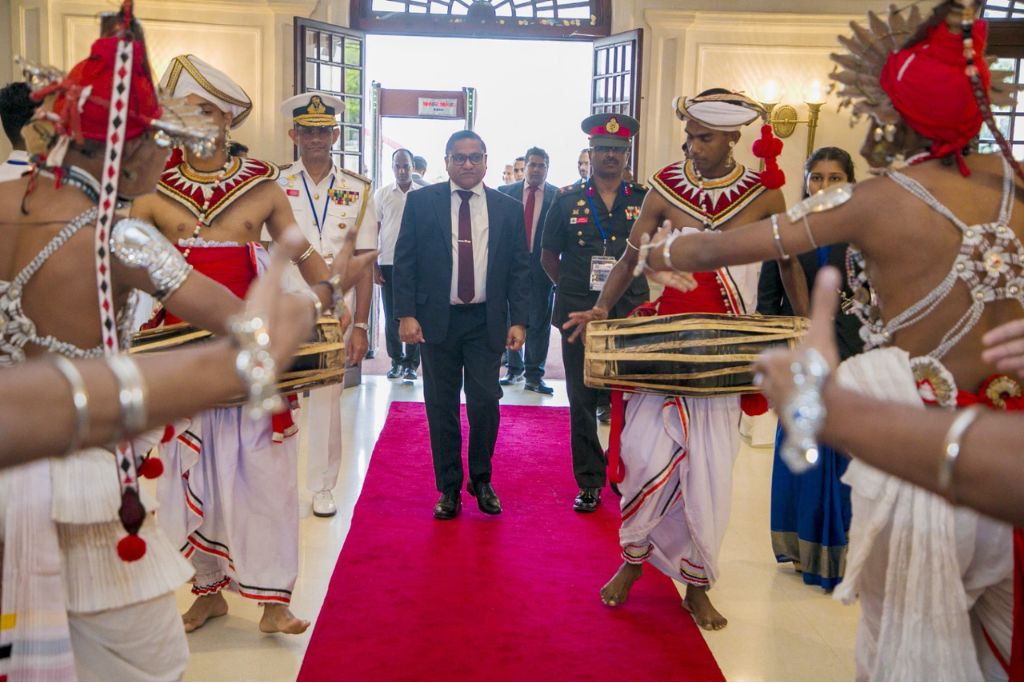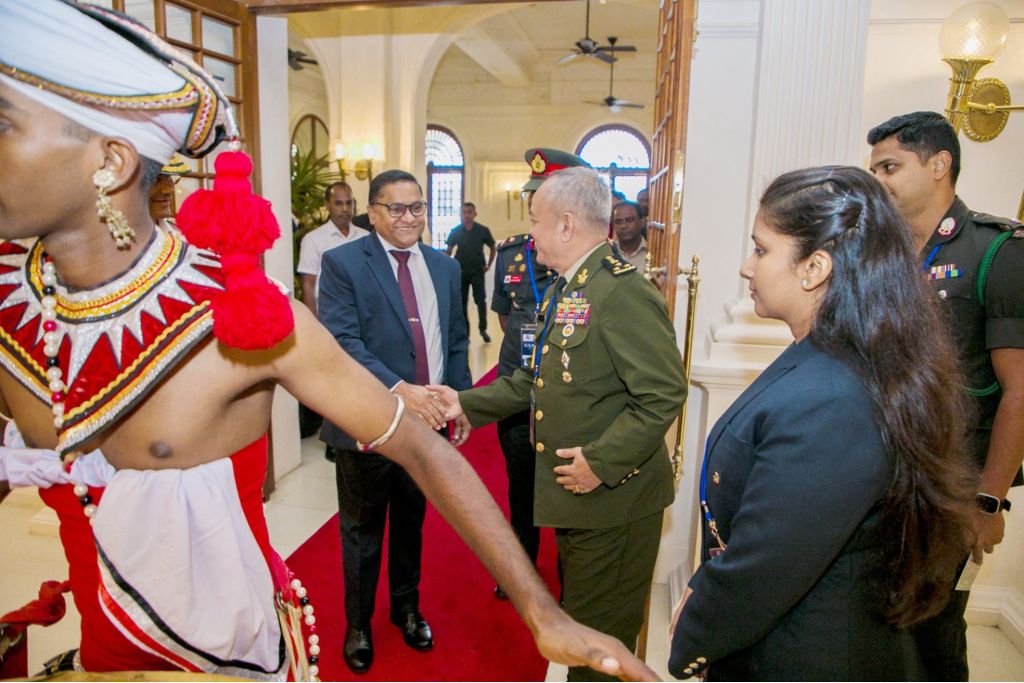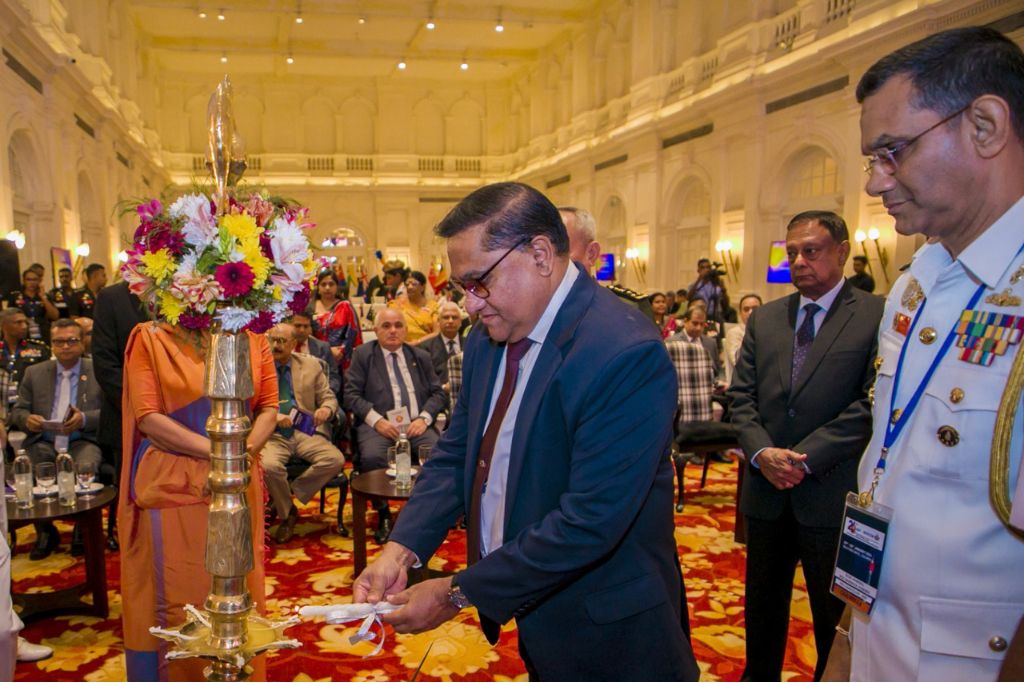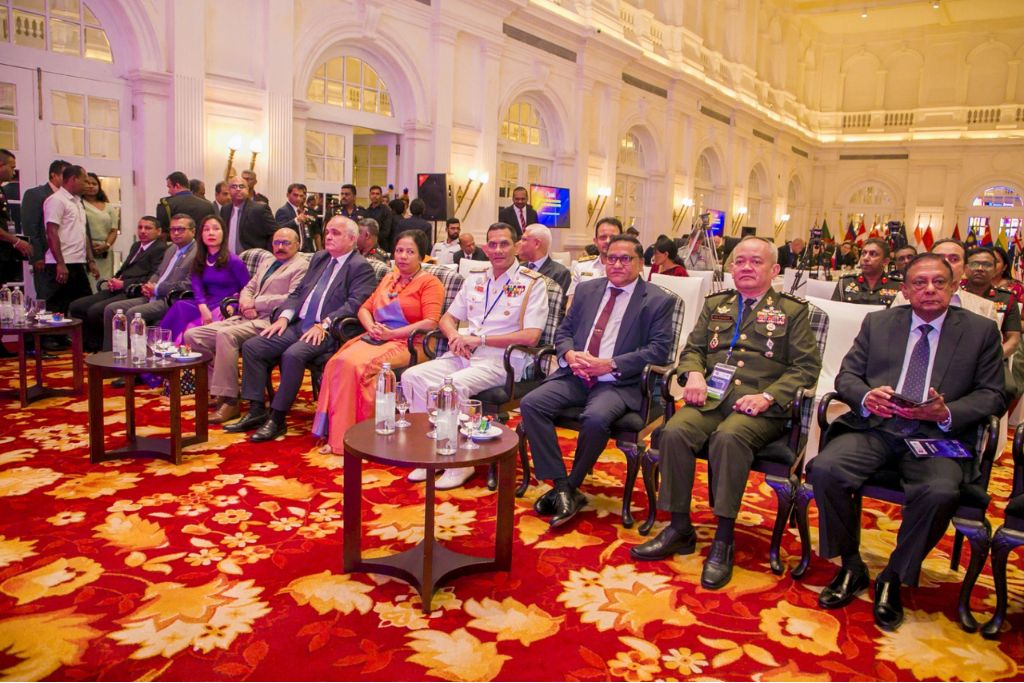Vijitha Herath, Minister of Foreign Affairs, Foreign Employment, and Tourism of Sri Lanka, delivered the keynote address at HDUCIM, emphasizing Sri Lanka’s vision of becoming a hub in the Indian Ocean. He highlighted the country’s strategic position and resources as key drivers for promoting trade, connectivity, economic development, and regional stability.
In addition to that the Minister emphasized the importance of upholding international humanitarian law and welcomed the recent ceasefire agreement as a step towards sustainable peace in Palestine and the broader region. Sri Lanka stands in solidarity with global efforts to ensure stability and security through diplomatic dialogue and multilateral cooperation.
Further Minister emphasized the necessity of maintaining neutrality while fostering strategic partnerships within the ASEAN framework and the importance of adapting defense strategies to contemporary geopolitical challenges, including power rivalries and economic uncertainties.
“Sri Lanka’s Vision as an Indian Ocean Hub: Strengthening Trade, Connectivity, and Regional Stability”
The 26th ARF Heads of Defense Universities, Colleges, and Institutions Meeting (HDUCIM) was co-chaired by Sri Lanka and Cambodia at the General Sir John Kotelawala Defense University (KDU). The event brought together defense officials, academics, and experts to enhance cooperation in defense education and strategic studies.
I am pleased to address the 26th ASEAN Regional Forum (ARF) Heads of Defence Universities, Colleges, and Institutions Meeting (HDUCIM), co-chaired by Sri Lanka and Cambodia. This is the first regional forum taking place in Sri Lanka since the election of the new President and Government. Our Government attaches particular importance to Sri Lanka’s relationship with ASEAN. As a tangible step in building closer ties with ASEAN, Sri Lanka continues to work actively and closely as a member of the ASEAN Regional Forum (ARF), and is pleased to host ARF events that aim to consolidate closer cooperation with ASEAN and its partner countries.




I am also pleased that this forum is being held in Sri Lanka and our premier Defence University; the KDU is playing a lead role in the discussions that are taking place with the participation of the best minds in the field of military science, strategy, and leadership in our region and beyond.
Sri Lanka is keen to maintain her neutrality and to contribute actively to the maintenance of regional peace and stability as a small state in a strategic location in the Indian Ocean region. We do not wish to be drawn into conflict or be compelled to choose sides. Respect for sovereignty and the rule of law that govern interactions between states are integral for the survival of small states, such as Sri Lanka, in an increasingly polarized world.
As a country with limited resources and hard power capabilities and a small open economy, our survival and development is intrinsically interlinked to a stable regional and global environment. Our approach to Defence therefore is shaped by our unique circumstances and inherent limitations. Much emphasis has been placed on being adequately prepared to defend our sovereignty and territorial integrity whilst also pursuing defence diplomacy by building strong, friendly relations with defence establishments and armed forces, bilaterally, regionally and globally.
Sri Lanka continues to remain deeply committed to maintaining global peace and security. Since deploying our first contingent in 1958 we have been contributing to UN Peacekeeping operations in some of its most hostile and demanding deployments. Over 25,817 men and women from the Sri Lanka armed forces and Police have contributed to ensuring international peace and security under the UN banner over the past 6 decades, and been commended for high calibre service.
Sri Lanka also actively contributes to regional efforts to counter-narcotics, counter-smuggling and suppress piracy as a member of the Combined Maritime Force (CMF) which is a 46 member naval partnership. The Sri Lanka Navy participates in joint maritime security operations, to promote a safe maritime environment as a part of this initiative.
Given the complexity of transnational security challenges that we all face, Sri Lanka believes in coordinated efforts to promote peace and stability.
We are dealing with a constantly shifting, uncertain, volatile global environment. Major power rivalry is increasing and along with it there is increased militarization which is spilling over to the Asia Pacific region including onto the maritime domain.
The rules based multilateral order is under threat. On the economic front, selective de-coupling and de-risking is taking place with increasingly protectionist measures being advanced by certain countries. These developments are directly impacting businesses and economies and are a significant strain on relationships between countries. This is not limited to the countries directly involved but also those countries which are a critical part of global supply chains. As a result there is an increased risk of widening global inequality. Geo-economic fragmentation may also lead to more trade between likeminded high-income economies, and significantly impact the growth prospects of developing economies.
On the security front, we are witnessing a resurgence of latent and open conflicts involving former and aspiring major powers. The war in Ukraine and the humanitarian crisis in Gaza have had far reaching consequences. Sri Lanka therefore welcomes the recent ceasefire agreement in Gaza and is optimistic that these developments will contribute to the establishment of sustainable peace in Palestine and the region.
We are also seeing the rise of minilateral alliances and partnerships emerging including those with both economic and security interests in the Asia Pacific region. The international architecture both from a security and financial perspective has not responded adequately to these developments.
We are also confronted with power diffusion from state actors to a diverse range of actors with the increase in digitalization and growth of social media. Technology and the empowerment of both the individual and non-state actors are issues that are impacting on global affairs.
Critical technology such as cyberspace and Artificial Intelligence (AI) are making new tools of war available. These changes have brought with it greater lethality and destruction and blurred the lines of conflict. Direct warfare is being replaced by hybrid warfare and grey zone tactics. It can be expected that AI will be deployed in cyber conflicts/cyber warfare given the greater acceptance of AI technology and the potential of AI to improve both offensive and defensive cyber capabilities. We are also seeing the resurgence of the threat of use of nuclear weapons in conflict situations.
These developments that I have outlined will have a significant impact on how we deal with the challenge of unmatched interests as we attempt to build an Asia-Pacific Framework of cooperation that benefit us all.
In this era of transition, diplomacy and defence are undergoing a profound transformation. The global landscape is increasingly shaped by cyber operations, strategic communications, and digital engagement. States must adapt not only their military strategies but also their approach to governance, regional cooperation, and global engagement. As defence strategies evolve, so must the approach to defence education, ensuring that all of us can contribute equally to the discourse on security through for such as this.
.
War and conflict is often a result of a failure of diplomacy, crisis management and peace keeping. We must seek new ways in which to keep dialogue and conversation channels open. Meanwhile, we must also take necessary steps to ensure our individual and collective security.
This ARF meeting on “defence education in an era of transition” therefore is both timely and crucial.
Modern day warfare has transformed dramatically, with next-generation threats such as cyber-attacks, hybrid warfare, space-based operations, and artificial intelligence defining conflicts. The digital age has expanded warfare beyond physical battlefields into cyberspace, social media, and the virtual domain. Artificial Intelligence (AI) is a driving force in this transformation. AI is revolutionizing intelligence gathering, surveillance, and automated defence systems. Breakthroughs in AI have enabled real-time data analysis, enhancing the speed and precision of threat detection. Autonomous systems like AI-powered drones and robotic soldiers are redefining modern combat scenarios. This shift requires states to embrace emerging technologies to remain relevant and secure.
The ability to adapt, innovate, and remain vigilant is vital to safeguard sovereignty and maintain influence. Sri Lanka, through its commitment to regional cooperation, exemplifies how small states can play a key role in advancing defence education and contributing to peace in a rapidly changing geopolitical landscape.
Defence education must, undergo a fundamental shift. It is no longer sufficient to focus solely on conventional security issues. The growing importance of digital diplomacy, cyber security, and information technology demands that defence education evolve to encompass these new of methods of defence and warfare. These new methods include cyber-attacks, disinformation campaigns, and digital manipulation. To navigate this complex environment, defence professionals must be equipped not only with the traditional knowledge of strategy and tactics but also with the skills necessary to engage in new forms of warfare.
Additionally, defence education must also encompass new areas that have an impact on the security of states such as climate security, energy security, food security and health security.
A holistic approach to defence education will ensure states are equipped with the strategies to deal with evolving threats.
The ARF provides an invaluable platform for dialogue on these pressing issues. Sri Lanka’s role as co-host of the 2025 ARF HDUCIM, alongside Cambodia, marks a milestone in strengthening regional defence cooperation. This meeting offers a useful opportunity to advance discussions on emerging security challenges and the role of defence education in shaping future military and diplomatic strategies.
The ARF HDUCIM has become a critical platform for leaders of defence institutions to address regional security issues and share best practices. By fostering academic exchanges and enhancing mutual understanding, we can promote peaceful conflict resolution, advance preventive diplomacy and build consensus on shared security challenges.
Additionally, Defence education must evolve to encompass new dimensions of conflict
Establishing collaborative networks among defence universities, colleges, and institutions is vital in facilitating the exchange of ideas, research outcomes, and best practices. This collective effort enhances the effectiveness of defence education diplomacy and plays a key role in supporting regional stability. As we continue to navigate the challenges of a rapidly changing security landscape, the importance of defence education in shaping the future of defence and diplomacy cannot be overstated. It is through these collaborative engagements that we can build a more resilient, sustainable, and peaceful world.
Sri Lanka, strategically positioned at the crossroads of international maritime trade routes, offers a valuable perspective on regional security. Our central location enhances connectivity within the Asia-Pacific. However, as global powers vie for influence in the region, Sri Lanka also faces the challenge of navigating unmatched interests while safeguarding its sovereignty and advancing its national interests.
As an Indian Ocean littoral state with a developing economy, we want to be able to provide services and economically benefit from the use of the ocean. We also want to benefit from the economic rise of Asia. War, conflict, rivalry unfortunately detracts from the important work we have ahead to deliver development, economic growth and prosperity to our people. In fact these rivalries are detrimental to our growth. Therefore, ensuring maritime security and stability in the Indian Ocean region remains a priority for Sri Lanka.
With a diverse cultural heritage and a history of international trade, Sri Lanka has traditionally maintained a non-aligned foreign policy, and friendly relations with all countries while seeking to balance relationships with multiple stakeholders. Sri Lanka’s vision of becoming a hub in the Indian Ocean reflects its desire to leverage its strategic position and resources to promote trade, connectivity, economic development and stability in the region.
Sri Lanka’s aspirations in defence education are focused on addressing evolving threats to regional security. Our focus is not only be on traditional defence strategies but also on strengthening collective capabilities in maritime security, cyber defence, and disaster relief. By fostering defense dialogues and building strong networks within ASEAN Regional Forum we want to ensure that our region remains secure and resilient.
Through shared learning, knowledge exchange, and joint training initiatives, Sri Lanka aims to contribute to a future where regional stability is supported by a cohesive, well-prepared defense community. We seek to play an active role in shaping the future of defense education and regional security in the Asia-Pacific region.
I am truly pleased to have had the opportunity to address the 26th SEAN Regional Forum (ARF) Heads of Defense Universities, Colleges, and Institutions Meeting (HDUCIM), co-chaired by Sri Lanka and Cambodia. Your presence here today signifies the enduring commitment we all share towards strengthening regional security and cooperation.
Together, let us continue to leverage our collective wisdom and strength, embracing both traditional values and innovative approaches. Through education, cooperation, and shared commitment, we can navigate the complexities of this contemporary world and secure a prosperous future for our region and beyond.